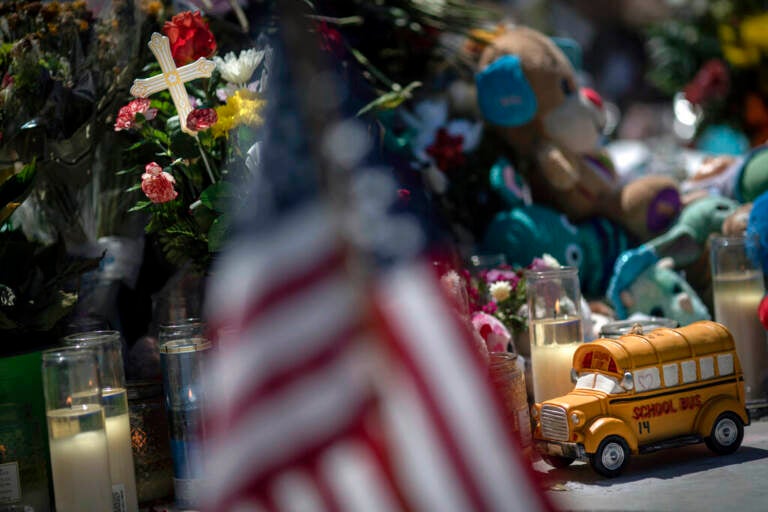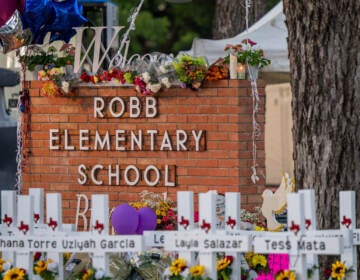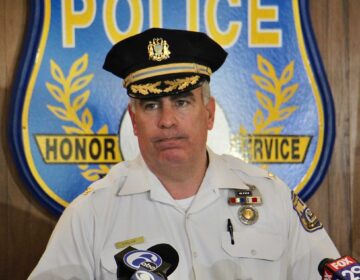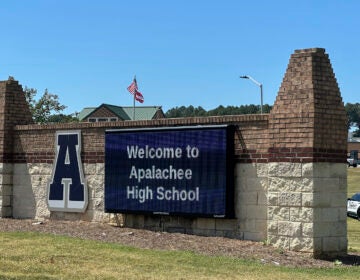Empty spaces, broken hearts in a Texas town gutted by loss
In a town as small as Uvalde, Texas, even those who didn’t lose their own child lost someone.

A toy yellow school bus is placed in front of a cross to honor Rojelio Torres, one of the children killed during the mass shooting in Robb Elementary School, while an American flag is seen in the foreground, Sunday, May 29, 2022, in Uvalde, Texas. (Wong Maye-E/AP)
Josie Albrecht drove frantically from house to house, retracing the school bus route she drives twice a day, delivering Uvalde’s children safely to and from school.
When she’d picked them up, hours earlier, they wore giddy grins, excited for summer break just days away: soccer, softball, freedom. She’d planned a pizza party to celebrate that afternoon. But before she could pick them up and drive them home, a gunman walked into their school and started shooting.
Now, days later, she was drawn to the town square and the 21 white crosses erected there, one for each of the 19 children and two teachers whose deaths left gaping holes in the marrow of a small town.
“It’s my job to take them home. I didn’t take my babies home,” Albrecht wailed, over and over.
In a town this small, 15,000 people, even those who didn’t lose their own child lost someone — their best friend, the little boy down the road who dribbled his basketball in the driveway, the kid who stood on the curb, backpack in hand, waiting for the bus. They see the empty spaces they left behind everywhere. The bus seats they won’t sit in. A baseball glove they won’t wear. Front doors they won’t skip from to join the neighborhood game of tag. Rivers they won’t fish in.
The town’s rhythms have always centered around their children. Before the shooting shattered their world, “what’s your son up to?” or “your daughter played a great game” were the most common exchanges when they run into people they knew, which was all the time because everyone knows everyone. If one of Albrecht’s riders misbehaved, she’d remind them that she knew their parents and grandparents and aunts and uncles.
Some say now that closeness is both their blessing and their curse: They can lean on each other to grieve. But every single one of them is grieving.
Albrecht calls her little riders “my kids,” and in the chaotic hours after the rampage, she was desperate to know if they’d made it home safe. She drove house to house. She reached the one where 10-year-old Rojelio Torres every morning waited at the curb with his little brother and sister. As he’d climb on, he’d always asked to sit in the back because that’s where the “visiting” happens and he liked to visit. He was “like a bull,” she said — charismatic, funny. He loved hot Takis. But he wasn’t home. His family stood shocked and weeping on the lawn. She knew.
A few days later, she brought a toy school bus to place at his cross at the memorial. “I love you and will miss you,” she wrote on it, and drew a broken heart at the place where he used to sit, in the back.
She wept, agonizing that she couldn’t save him, and a local doctor hugged her. “There was nothing you could do,” said John Preddy, a family practitioner, who delivered two of these dead children and cared for them all their short lives, their scraped knees and runny noses.
His office a few blocks away is decorated in an old west style, with John Wayne memorabilia, because he wants the kids to have fun.
“You spend your life trying to keep them healthy and to watch these kids grow,” he said. “He took away in a matter of seconds what their mothers and their fathers and their grandparents and I and everyone has done to try to make their lives good and make them healthy and move them ahead and make them successful in the world. That literally got snuffed out in a matter of seconds.”
He looked around the square, which used to be a sleepy park, ringed by antique shops, the town’s theater, a barber. And now it’s the heart of their mourning: The mounds of flowers and gifts at the foot of the crosses are 2 feet tall — a tangible expression of unspeakable grief. Days after the shooting, they added a 22nd cross for Joe Garcia, the husband of teacher Irma Garcia, who died trying to protect her students. Two days after the attack, he visited this memorial to her, brought her flowers, went home and died of a heart attack.
“This destroys lives,” said Preddy, who’s been a doctor here for 30 years. “It’s our lives, these kids are our lives.”
He tried to do the math: 19 children, each with parents, grandparents, siblings, aunts, uncles.
“When you start adding that up and you spread it out, there’s thousands of connections that those kids have: teachers, bus drivers, people that cut their hair. All of that is interconnected,” he said. “So they touch thousands of people’s lives, these kids, pretty much everybody in town.”
The mourners left things these children had cherished and will never touch again: a flower made from pipe cleaners, a wreath of crayons, Hot Wheels, a princess crown, a baseball on which someone had written “good game,” a bag of chocolate-covered pretzels.
The white crosses are covered in messages written in Sharpie.
“Mommy loves you.”
“I will eat a smore just for you.”
“I will take care of your grandma.”
As people arrived at the square, they hugged and pleaded: “Why? Why? Why? Why?”
They need answers, Preddy said.
The police have changed the account of their response many times, finally admitting days after the shooting that officers gathered in the hallway of the school waited more than an hour to storm the classrooms where the gunman was holed up, as children inside called 911 over and over, whispering pleas to save them.
The political questions are also thundering through town: How could a troubled young man walk out of a gun shop with a weapon made for war days after his 18th birthday, asked Preddy and many others.
Preddy, a gun-owning conservative, also wondered: How could this country have done nothing for a decade after 20 students and six adults were killed at Sandy Hook Elementary School in Newtown, Connecticut?
“Our kids can’t live like this, they can’t. We can’t let my kids, my grandkids live like this for the rest of their lives and for their kids’ lives,” he said. “We just can’t have that.”
People are scared. The places where these kids would have played are closed or quiet. A sign hanging on the door of a candy shop said the community needed time to heal. At the city park, the swing sets were empty. No kids played in the wooden climbing castle where they used to carve their names and their crushes. The ones who died never will again.
“It feels empty, there’s an emptiness to it,” said Lydia Carrasco, a 76-year-old grandmother who likes to come to the park to eat breakfast and watch kids run around. “It just feels lonesome, that you don’t see the children.”
Down her road, her neighbor’s boy was killed, and she used to love to hear him playing basketball in the driveway. She feels helpless, because she knows so many people who lost children, and she has no idea what to say to console them. She lost her own son earlier this month; he was 57. It’s a hurt that’s hard to explain: It feels unnatural, she said, to bury a child. They are supposed to outlive you, be your legacy, and then that’s over, all of a sudden.
She likes to watch the kids play because it reminds her of when her own children were young and free and innocent. But it feels like her whole town has been robbed of that innocence.
Raquel Martinez and her four children stayed home for days, holding each other. They’re scared, she said. Her two daughters, 15 and 11 years old, stood crying at a memorial. They’d both been taught by the two teachers who died, Irma Garcia and Eva Mireles. They were kind, the girls said, always smiling, always helpful. Their 8-year-old cousin was in the school at the time but made it out alive.
“Heartbreaking,” Martinez said, doesn’t sound like a big enough word for this. “Heart-shattering,” she offered, instead.
The family left home for the first time a few days after the shooting to go to the grocery, then drop off flowers for their fallen teachers and children. Martinez kept her kids close.
“I don’t feel safe anywhere,” she said. “You’d never think this could happen here. How can you know where it’s going to happen next and when?”
They’d had big plans for the summer, soccer, softball, playing outside with their friends. But they don’t know about any of that anymore.
“That’s the worst part about it,” Martinez said. “They were almost out of school, just days away, they were getting ready to just be kids, be free.”
Across town, 8-year-old Jeremiah Lennon sits quietly on his couch most of the time, staring off into space. Before all this, he was an excitable kid, said his grandma, Brenda Morales. He’d come home from school, eat, head outside to play tag or hide and seek with the neighborhood children.
“He’s different now,” Morales said. He doesn’t eat much. He doesn’t talk much, either. “He’s changed. Everything’s changed.”
The third grader had been in a classroom just next to the rooms where the shooter holed up.
The 15 kids in his class sat on the ground in the corner, as quiet as they could be, he said. The gunman tried to get in but the door was locked. Jeremiah said he was mad at first, because they were missing recess. He was also terrified: “I was scared I would get shot, my friends would get shot.”
He told his mom later that some of his classmates were crying, and he wanted to be brave and strong for them, so he did not let himself cry.
Outside the school’s walls, word started spreading.
His mom, Ashley Morales, rushed to the civic center where parents were told they’d be reunited with their kids. She waited there for two hours; it seemed like an eternity. Then Jeremiah emerged, the last kid out. She hugged him and wept. “My baby, my baby, what would happen if I didn’t have my baby?”
Their family has lived here generations. They’re connected somehow to just about everyone in town, so when the names started to emerge of the children who died, they were stunned.
Three of Jeremiah’s friends died, including a boy who lived across the courtyard of his apartment complex — the boys had played together almost every day. Two of their cousins lost daughters, and a neighbor lost a daughter, too. Ashley’s co-workers at a fast-food restaurant lost relatives; she asks them how they’re doing and they try to put on a brave face and say they’re OK, but she knows they are not.
Her mother, Brenda Morales, said they’ve struggled with guilt: Jeremiah made it out alive and so many others didn’t.
“I don’t know why he decided to kill my friends,” said the boy, bouncing nervously on a trampoline. They don’t know what to say, except that his friends are in heaven now with God.
They also don’t know what to say when he tells them he doesn’t want to go back to school in the fall.
“They’ll kill me,” he says.
He wants to be a police officer when he grows up, “so I can arrest bad guys, the people who have the guns.” He wants his friends to feel safe again.
Every time they walk out of their apartment, he gazes across the courtyard to the door where his best friend had lived.
He reminds his mom: “My friend isn’t there anymore.”
WHYY is your source for fact-based, in-depth journalism and information. As a nonprofit organization, we rely on financial support from readers like you. Please give today.






